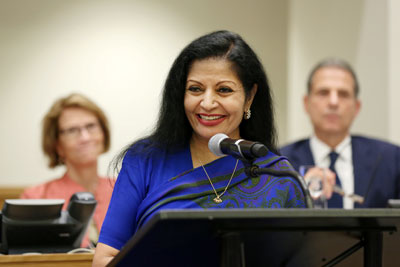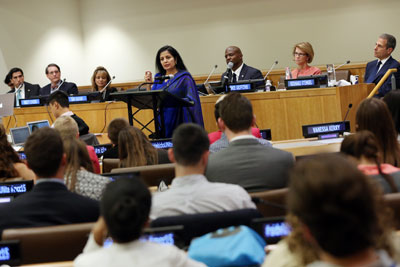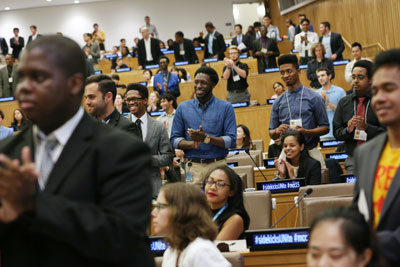“The power of self-realized young women is immense” – Lakshmi Puri
Speech by UN Women Deputy Executive Director Lakshmi Puri, who accepted the Global Generation Award on behalf of UN Women at the 7th Annual Millennium Campus Conference on 14 August, in New York.Date:
Distinguished youth leaders, guests and colleagues,

I would like to start by especially recognizing Sam and his team for pioneering the Millennium Campus Network that brings young students into the forefront of global policy dialogue and most importantly supports youth to take local action in their communities.
Thank you for this honour of the Global Generation Award – I am humbled to be recognized by the youth movement. Belonging as I do to what in our corner of discourse we call the Beijing generation, it is a double reward to be recognized not only for what UN-Women does to promote the most important project for humanity in this century — Gender Equality and Women’s Empowerment — but also my commitment to both engendering the Global Youth Agenda and driving a partnership with youth in the gender equality agenda.
This is a pivotal point beginning with the Third International Conference on Financing for Development in Addis Ababa and the 2030 Agenda for Sustainable Development, never before has gender equality and women’s empowerment been given this level of focus, prioritization and action.
One of the most difficult to achieve areas of transformation that the 2030 Sustainable Development Agenda and UN-Women are committing to is gender equality and women’s empowerment. Currently, there are 1.8 billion young people (10-24 years old) in the world. Of these, 600 million are adolescent girls and young women. Here are some alarming statistics:
- Trends show that one in three girls in developing countries (excluding China) are likely to be married before the age of 18 and one in nine girls will marry before their fifteenth birthday. In 2010, over 67 million women aged 20-24 had been married as girls. If such trends continue, 142 million girls will be married every year over the next decade.
- Globally, young women aged 15–24 are most vulnerable to HIV, with infection rates twice as high as in young men, at 0.6 per cent. This disparity is most pronounced in sub-Saharan Africa, where 3.1 per cent of young women are living with HIV, versus 1.3 per cent of young men.
- Figures on the magnitude of human trafficking are difficult to calculate, but using improved methodology, recent 2012 ILO estimates suggest that women and girls make up 55 per cent of the estimated 20.9 million people trafficked.
- Approximately 140 million girls and women in the world have suffered female genital mutilation/cutting, with more than 3 million girls in Africa annually at risk of the practice.

It’s often a Sisyphean, uphill task — two steps forward and upward and three steps back and downwards as we have seen in so many parts of the world. This is because it's not as simple as providing bed nets to prevent Malaria or polio vaccines. It’s about transforming social norms and disrupting entrenched power structures, removing traditional barriers, changing religious, patriarchal and custom-induced stereotypes and combatting discriminatory and harmful practices and gender-based violence. It's also about converting the older generation married to bad old ways to the cause and creating a new global solidarity movement for gender equality and women’s empowerment.
Youth action on the ground is important to eliminating these deeply entrenched stereotypes and practices. Hence, this can only be achieved by harnessing youth power. By getting them to break the existing moulds and constructing, as well as, reinforcing a new gender equal world — one with urgency and determination which is what the Sustainable Development Agenda 2030 is committing to do. We are not only ensuring a Planet 50-50 latest by 2030, but making the gains irreversible.
Transforming our world: the 2030 Agenda for Sustainable Development to finally be adopted at Summit-level in September, commits all countries, rich and poor, to an ambitious, human-rights based, transformative agenda that integrates economic, social and environmentally sustainable development.
UN Women is privileged to have supported and mobilized to ensure that gender equality and women’s empowerment is prioritized in this once-in-a-generation compact in the preamble, in paragraph 21, in stand-alone SDG 5, and in gender-sensitive targets in other key SDGs, from poverty eradication, health, education, food security and agriculture, water and sanitation, employment, sustainable energy and human settlements, to climate change, etc. Gender mainstreaming in all aspects of implementation and data, follow-up, monitoring and accountability. This is indeed UN Women’s biggest normative triumph!
Goal 5 is about not just promoting but achieving gender equality and women's empowerment — for ALL women and girls — leaving no woman or girl behind, regardless of her age, income status, race and location — thus taking everyone forward.
Each of the targets have salience for young women and their agency but also require young men's partnership:
- To end all forms of discrimination through reform and effective implementation of laws, policies and measures that impact young women, affirmative action may be necessary for young women to achieve substantive equality.
- Ending all forms of violence against women and girls — this means young women who are most targeted for all forms of violence: Physical, emotional and psychological violence, domestic violence and abuse, sexual violence including sexual slavery, sexual harassment in the work place assault, rape and other forms of violence in public spaces, including in conflict and post-conflict situations. Violent extremism is targeting women for sexual slavery.
- Ending harmful practices such as child marriages, female genital mutilation (FGM), impacts young women's empowerment, their right to a life free from violence and respect for their right to bodily integrity. Men must support these efforts by refusing to marry child brides and by joining the campaign to end FGM.
- Universal access to sexual health and reproductive rights is critical for young women. It defines the cost of not having access to this right to control their sexuality and reproductive role without coercion, violence and discrimination, to make decisions on when and who to marry, decisions on child spacing, family planning, contraception, etc.
- We need to promote equal participation and leadership of young women in economic, social and political spheres. Young women need to be in the pipeline of leadership and politics at all levels of governance, and in non-traditional professions.
- Ensuring equal access to, and control over, ownership of productive assets such as land, property, financial assets and services and other infrastructure is key, as well as ensuring inheritance rights for young women and capacity and skills development in entrepreneurship.
- We need to recognize and value unpaid care work of women — young women especially — and ensure social and State provisioning of paid care services and to encourage young fathers to support in caring and nurturing responsibilities.
- We need to ensure means of implementation — laws, policies and measures — with all stakeholders, citizens and governments as duty bearers.
- We need to promote young women in science and technology. Young women and young men can play a critical role in use of ICTs to overcome the digital gender gap and engender the Internet and big data. We need to end gender insensitive online messages, cyber sexual harassment, cyber stalking and bullying.

The power of self-realized young women themselves as both the subjects and agents of transformation and empowerment is immense. So we must provide them with means, ecosystems and resources to realize their full potential.
Young men must also be enablers and partners in this. There is a myth that gender equality and young women's empowerment is somehow about taking power away from men. To the extent patriarchal structures and harmful, domineering, aggressive and violent constructs of masculinities perpetuate discrimination they must be dismantled and rebuilt. We need to focus on men and boys that stand together on gender equality, and also call for new more positive constructs of what it means to be a man must be built.
At the same time you must realize that gender equality is empowering for both young women and young men — it’s a positive sum game as more balanced, and mutually respectful gender relationships, make for greater harmony, happiness and success for all. That's the message youth must imbibe and give to their families, communities and societies, thereby transforming the economies and polities which they grow and shape.
You have to weave new narratives and stories to preach to the converted, but most importantly to the vast majority waiting to be convinced. We must use all the tools including ICT and social media, but also reach out to those offline across the digital, income and gender divide.
So dear friends, young men, young women and youth leaders. He-For-She and She for She alike.
Here is my call to you:
- Do become a Youth Champion of Sustainable Development and Gender Equality.
- Don't be mistaken and have outdated notions that gender inequality and discrimination against women somehow represents the Natural order! It does not. It's a man-made order which has been crying out for change that cannot be postponed any longer.
- Do spread the recognition that sustainable development, equality, peace and security, human rights and humanitarian action is an indispensable and vital enabler and beneficiary of gender equality and women’s empowerment. Without that, no progress will be made by humankind in any area.
- Do propagate the values of Goal 5 for both young women and young men and of realizing gender-sensitive targets in the SDGs on poverty eradication, health, education, sustainable energy, food security and agriculture, decent jobs and full employment, peaceful societies, water and sanitation, renewable energy, sustainable human settlements and climate change, among others.
- Don't be a passive receptor and transmitter of gender inequalities, unjust and gender discriminatory institutions, laws, policies, norms and practices.
- Be the active force for a new just and gender equal — and hence sustainable — world order in every way and lead from the front!
- Don't tolerate gender injustice around you. Provoke outrage. Do what it takes to fight and vanquish it.
- Don’t engage in gender discriminatory actions and practices.
- Do set new standards in gender sensitivity and uphold the dignity, security, integrity and human rights of all women — whether in your life or not.
- Do turn apathy to empathy, scepticism to self-belief in the infinite power of possibilities to move the marker. GENDER EQUALITY IS MISSION POSSIBLE.
UN Women attaches great importance to youth and women’s empowerment working in symbiosis to achieve Planet 50-50 but also to achieve all the SDGs in unison.
Do join us at UN Women in making our youth strategy a reality. The upcoming UN Women youth strategy will strengthen initiatives for empowerment of young women and develop young men as partners in gender equality, women’s empowerment and women’s rights.
Hence our youth strategy seeks to use the idealism, imagination of youth to dream, to reenvision. As the Nigerian author Onuoha said: “Youth is our arrow to the Future" — a bright, prosperous, socially just and ecologically sustainable future and the transformed world we want and world we deserve.
At the same, time we seek to harness the energy, passion, commitment, optimism and actions of young women and men — the Twin Turbo Engine — I call it, to power us to our destination.